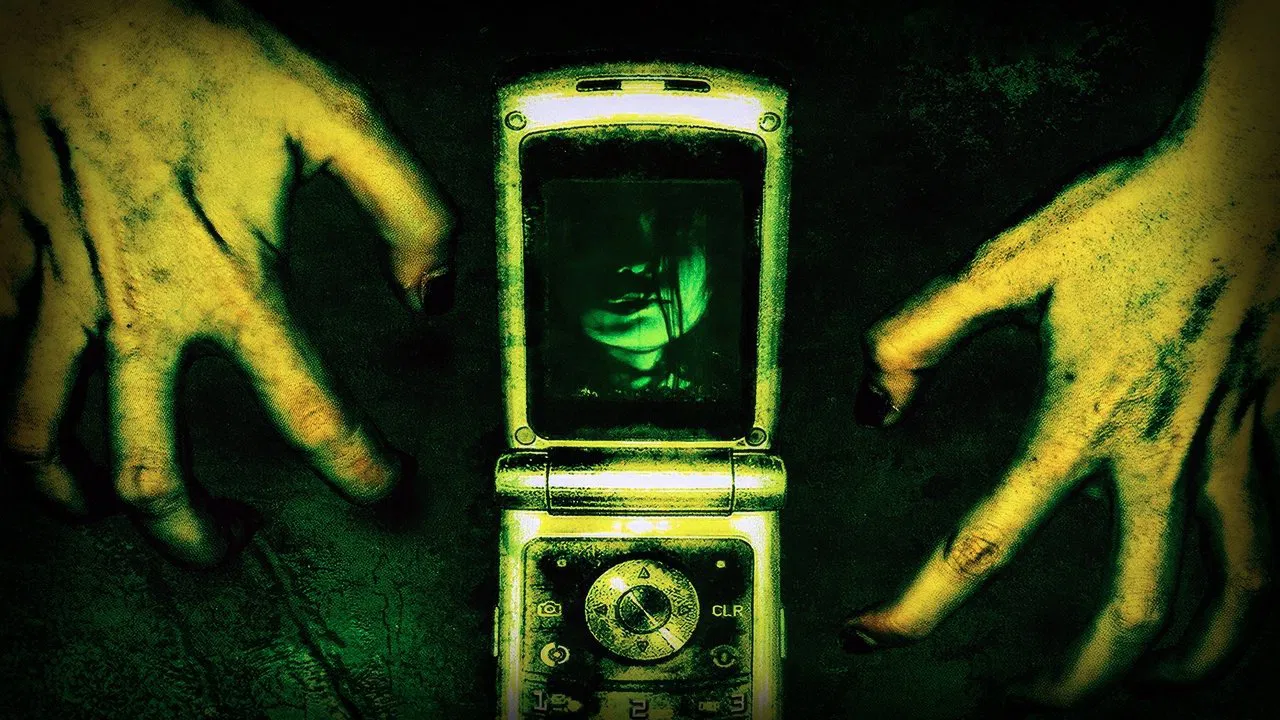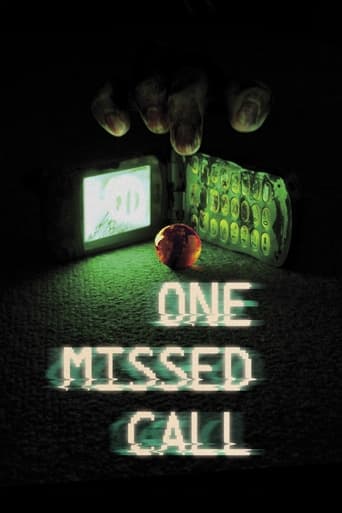

I was really surprised with this movie , because all over the Asian movie line it is hyped to the top with ringu and Ju-on, which i have not got round to seeing. But nowhere mentioned this scary gem by horror legend takashi miike. The storyline is good and the acting was at its best for a horror movie. The only bad thing would be that i was expecting to jump a bit more than i did. However this film still leaved me pretty restless.I won't be answering my phone to any unknown numbers any time soon. The concept of ghosts getting to you through technology is something very scary, and clearly Asia is extremely good and covering this concept.Now from what i have heard people say just another grudge movie. Now i do dis-agree as ever movie is different in itself. This was directed and acted brilliantly and the effects were visually great. Many cliff hangers which you expect the film to end on but it just throws you back into the world of darkness again and again and again. This is a classic horror epic and i recommend to any horror fan. Ps. subtitles aren't a problem for me, But whatever you do don't go see the crappy remake.
... View MoreI watched the Japanese horror film, One Missed Call last night, and i thought that it was a excellent film, and far better than the American remake. It is about a teenager Yoko Okazaki who is in a bar with her friends, she receives a voice mail from the future telling the date and time when she will die. The next day, Yumi hears a group of students talking about the story where people are mysteriously receiving phone calls with the exact date and time of their death. a couple of days later at the exact hour, Yoko is attacked by a supernatural force in a train station, while she is talking to her friend Yumi Nakamura. Yumi finds out Kioto's boyfriend Kenji Kawaia also received a call, and she witnesses his death in an lift. When her roommate Natsumi Konishi receives a call, Yoko becomes friends with Hiroshi Yamashita, who tells her that his sister Ritsuko was the first victim of the phone call. They find that the name of Marie Mizunuma and her daughters Mimiko and Nanako have something to do with the strange phone calls. They begin a search to find out what is going on. I thought that this was a very good film and would recommend people to see it. 7/10
... View MoreThis movie made me grab some cell phones and delete my number. Although I do not believe in spirits haunting phones i do believe in spirits such as death and demons. I also believe in bad luck streaks jumping from people to people. That said lets move on to the actually movie.Plot: I never heard of a plot so twisted (literally the twist were at every other scene) I was not sure what was happening until it had happened and I paused and took a few minutes to collect my thoughts on what just transpired. My line of thought was simple at first. People get a call hearing their death they die soon after and candy pops out their mouth they make one more call to someone in their contact list that person is next. Then the questions started coming in. This is when i got confused. Why did candy pop out their mouth? Why a cell phone? Why do they have to die? So on and so forth. The answers somewhat make sense. . . and i really emphasis the somewhat. But they do make sense. Execution: I do not believe it could have been done better. That pretty much all i have to say about the execution. It was a decent length the subs were not a blinding color and a blur across the bottom of the screen. The acting was decent even if their dialogue was predictable at times although the story itself was not.Climax: A beautiful flash of humanity and our fear of death and how we overcome it to live or so i thought until the final 2 twist come in and she stabs her companion as he tries to save her. Closing: It was almost perfect but i was not sure if the male star would be finishing his piece of candy. I hate open endings that leave you wondering was it solved or is he still gonna die.
... View MoreChakushin Ari is set in Japan where teenager Yumi Nakamura (Kou Shibasaki) attends University, while eating out her friend Yoko Okazaki (Anna Nagata) receives a call on her mobile. Yoko missed the call but a voice message was left, the strange message is dated the 18th April which is two days away & came from her own mobile number. Then two days later on the 18th Yoko dies in a mysterious accident, after that her friend Kenji Kawai (Atsushi Ida) receives a similar call & he too dies in mysterious circumstances shortly after. The rumour going around the University is that an evil ghost is killing people & using the contact list in their mobile phones to select another victim. Then Yumi's best friend Natsumi Yamashita (Shin'ichi Tsutsumi) receives a call, determined not to let her friend die or even become the next victim Yumi sets out to find the truth behind the killings & stop it...More commonly known under the title One Missed Call to English speaking audiences this Japanese production was directed by Takashi Miike & for me is another rubbishy Asian ghost story, to be brutally honest it's a straight rip-off of Ringu (1998) only difference being instead of a mysterious video tape Chakushin Ari revolves around mobile phones. I suppose it had to happen, since mobile phones have become such an integral part of modern culture it was inevitable someone was going to make a horror film based around them & you know even evil killer ghost's have to keep up with the times & use mobile phones. The basic concept to me seems laughable as Chakushin Ari tries to make something as common & everyday as a mobile phone call scary & for me it fails totally. I'm sorry but seeing a mobile phone rings just isn't scary or a concept that sends shivers down my spine, that's basically what it boils down to & a big reason why I found Chakushin Ari so dull, lifeless & such a chore to sit through. The script by Minako Daira was based on a novel by Yasushi Akimoto & is throughly slow going, I found the whole story revolving around some sort of ghost who was wronged in someway when they were alive & wanting some sort of revenge old hat & the Japanese have flogged the idea to death & usually with considerably more success than Chakushin Ari. Then there's the ending, it's absolutely terrible & doesn't really make any sort of sense although maybe it's lost in the English translation. The ending is a complete mess that seems to have time travel, possession, ghost's & no sort of closure. The one thing I did learn from this film though is if a rotten zombie is walking towards you with the intent to kill you then hug it & say nice things to it, it'll work a treat.Director Miike is usually known for his more outrageous & gory films but here with Chakushin Ari he really tones it down, there's certainly no blood or gore or violence expect for a severed arm. To be honest there's nothing here we haven't seen loads of times before, there's the obligatory female ghost who walks funny & makes strange noises that every Japanese supernatural horror film must include. Been there, done it & brought the T-shirt. Things pick up a bit towards the end with a haunted hospital but it's never really revealed why the hospital is haunted or how a woman's dead body got there or how it's mobile phone battery hasn't run out in six months. Like most of these Japanese ghost films Chakushin Ari is filmed in muted colours & in a very simple sort of way, it just looks bland & forgettable although maybe that was the intention.Technically the film is alright, there's nothing here that's going to amaze anyone but it's reasonably well made for what it is. I must admit I really don't like subtitled films, I just find them a chore to watch & very distracting. The acting seems alright but since we never know what anyone is saying it's difficult to judge.Chakushin Ari is a tedious film that I really didn't enjoy at all, I found it a throughly boring mess with a less than inspiring central premise that were mostly rehashes of other similar films. The film proved popular enough to spawn two sequels Chakushin Ari 2 (2005), Chakushin Ari Final (2006) as well as a Japanese TV series & a Hollywood remake.
... View More